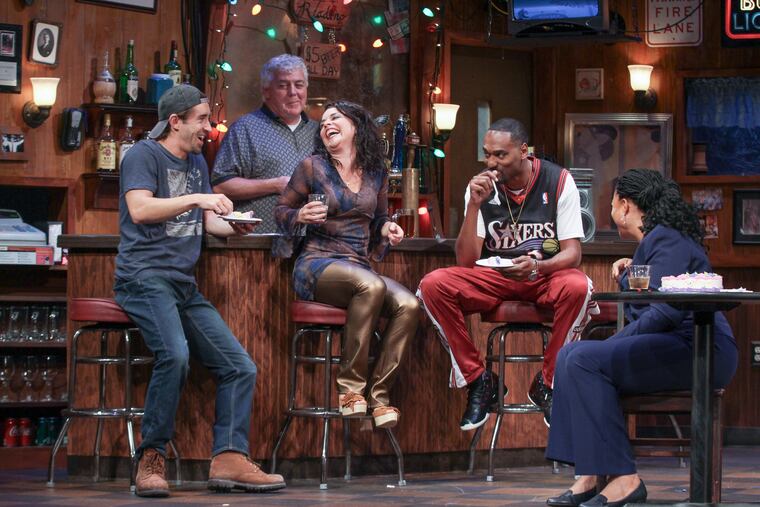‘Sweat’ at Philadelphia Theatre Company: Image of a town, and a society, being torn apart
The Philadelphia Theatre Company's comeback production is Lynn Nottage's "Sweat," a very contemporary play that portrays out-of-work steelworkers in Reading, wondering where their jobs and city went. As the jobs go, relations decay among old friends, and old social oppositions, racial, generational, and more, emerge. The production is sometimes sketchy, and the characters should evoke more sympathy than they do, but "Sweat" at PTC delivers a sadly relevant portrait of a society in collapse.

As Paige Price, Philadelphia Theatre Company's new producing artistic director, said on opening night, "We are ba-ack!" After a year's hiatus, the lights are on in the Suzanne Roberts Theatre as Lynn Nottage's Pulitzer Prize-winning Sweat takes the stage.
Sweat is a very contemporary, very American play, based on a series of interviews Nottage conducted in Reading, Pa., a small city that is, simply, out of business. When the factories and mills close down and the unions are helpless, good people are trapped by bad circumstances.
Sweat concerns greed and racial resentment and all the familiar Us-versus-Thems: black/white, rich/poor, blue collar/white collar, loyalty/betrayal, pride/shame, inertia/ambition, parents/children. As one character says, "The writing's on the wall and we're still out here pretending we can't read." The American dream has turned into a nightmare for people who are desperate, enraged, despairing, drunk, drug-addicted, and broke.
The drama begins as a parole officer (Brian Anthony Wilson) first advises Jason (Matteo Scammell), whose face is covered with Aryan Brotherhood tattoos, and then, on the other side of the stage, advises the man who was Jason's best friend, serious, God-fearing, glasses-wearing Chris (Walter DeShields). This sets up the plot's mystery: What did these two men do eight years ago that sent them to prison?
Flashback to a birthday party in the neighborhood bar (great set designed by Christopher Ash). Among those present are the always drunk Jessie (Suli Holum, who makes her small role deeply sympathetic, remembering a Jessie who might have been); Tracey (Kittson O'Neill, who seems miscast with her fake tough-guy manner), who is Jason's mother; and her best friend, Cynthia (Kimberly S. Fairbanks), who is Chris' mother and who "crosses the line" when a promotion makes her management. Cynthia's slick-talking wreck of a husband, Brucie (the excellent Damien J. Wallace), will show up periodically to beg for money. Presiding over all is the bartender, Stan (Rich Hebert, who quietly and solidly anchors the show), and his part-time help, Oscar (J. Hernandez).
We watch time go by with two more birthday parties; as their financial situation worsens, these decent people turn nasty, friendships crumble, and bigotry becomes the new normal. The spectacular barroom brawl (fight choreography by Rick Sordelet) reveals ugly truths.
Nottage punctuates her script with political updates — presidential debate, school shooting, the Olympics — via the bar's TV. These need to be clearer and larger than they are in this sometimes sketchy production directed by Justin Emeka. The characters should evoke more sympathy, and the events should shock us more than they do, and Nottage's powerful, wise lines are sometimes lost in delivery. But what PTC's production does deliver is a sadly relevant portrait of a society in collapse.